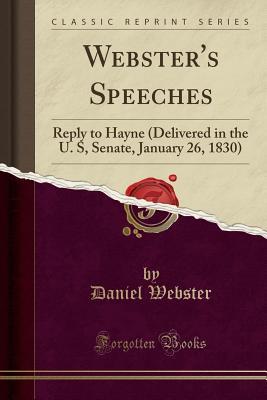Webster's Speeches: Reply to Hayne (Delivered in the U. S, Senate, January 26, 1830) (Classic Reprint)
by Daniel Webster
Excerpt from Webster's Speeches: Reply to Hayne (Delivered in the U. S, Senate, January 26, 1830)
During his childhood the future statesman was sickly and deli cate, giving no promise of the robust and vigorous frame which he had in his manhood. In his Autoez'ogmp/zy, written for a private friend in 1829, though extending only to 1817, he says he does not remember when or by whom he was taught to read and that he cannot recollect a time when he could not read the Bible. His father had a mind strong and healthy by nature, insomuch that he became a sort of intellectual leader in the neighborhood. He seemed to have no higher aim in life than to educate his children to the utmost of his limited ability. To small town schools of the neighborhood Daniel was sent with the other children. When the school was near by it was easy to attend but sometimes he had to go, in winter, two and a half or three miles, still living at home at other times, when the school was further off, his father boarded him out in a neighboring family.
About the Publisher
Forgotten Books publishes hundreds of thousands of rare and classic books. Find more at www.forgottenbooks.comwww.forgottenbooks.com
This book is a reproduction of an important historical work. Forgotten Books uses state-of-the-art technology to digitally reconstruct the work, preserving the original format whilst repairing imperfections present in the aged copy. In rare cases, an imperfection in the original, such as a blemish or missing page, may be replicated in our edition. We do, however, repair the vast majority of imperfections successfully; any imperfections that remain are intentionally left to preserve the state of such historical works.
During his childhood the future statesman was sickly and deli cate, giving no promise of the robust and vigorous frame which he had in his manhood. In his Autoez'ogmp/zy, written for a private friend in 1829, though extending only to 1817, he says he does not remember when or by whom he was taught to read and that he cannot recollect a time when he could not read the Bible. His father had a mind strong and healthy by nature, insomuch that he became a sort of intellectual leader in the neighborhood. He seemed to have no higher aim in life than to educate his children to the utmost of his limited ability. To small town schools of the neighborhood Daniel was sent with the other children. When the school was near by it was easy to attend but sometimes he had to go, in winter, two and a half or three miles, still living at home at other times, when the school was further off, his father boarded him out in a neighboring family.
About the Publisher
Forgotten Books publishes hundreds of thousands of rare and classic books. Find more at www.forgottenbooks.comwww.forgottenbooks.com
This book is a reproduction of an important historical work. Forgotten Books uses state-of-the-art technology to digitally reconstruct the work, preserving the original format whilst repairing imperfections present in the aged copy. In rare cases, an imperfection in the original, such as a blemish or missing page, may be replicated in our edition. We do, however, repair the vast majority of imperfections successfully; any imperfections that remain are intentionally left to preserve the state of such historical works.
BUY NOW
Paperback, 180 pages
Published November 13th 2018 by Forgotten Books
© 2025 Bibleportal.com 版权所有.

Daniel Webster was a leading American statesman during the nation's Antebellum Period. He first rose to regional prominence through his defense of New England shipping interests. His increasingly nationalistic views and the effectiveness with which he articulated them led Webster to become one of the most famous orators and influential Whig leaders of the Second Party System.
Daniel Webster was an attorney, and served as legal counsel in several cases that established important constitutional precedents that bolstered the authority of the Federal government. As Secretary of State, he negotiated the Webster-Ashburton Treaty that established the definitive eastern border between the United States and Canada.
Webster tried three times to achieve the Presidency; all three bids failed, the final one in part because of his compromises. Similarly, Webster's efforts to steer the nation away from civil war toward a definite peace ultimately proved futile. Despite this, Webster came to be esteemed for these efforts and was officially named by the U.S. Senate in 1957 as one of its five most outstanding members.
... Show more